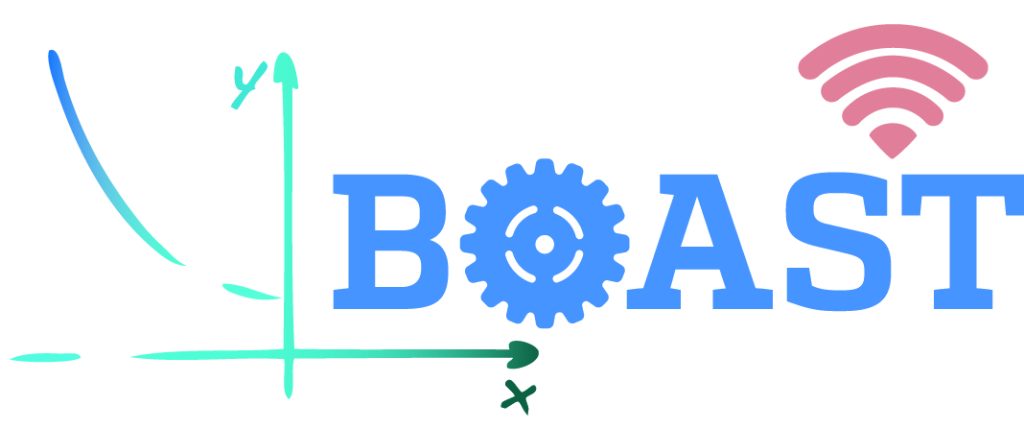
What is BOAST?
The Baltimore Online Algebra for Students in Technology (BOAST) Program is a free, afterschool program for high school students who are interested in STEM fields and careers and want to apply their math skills to solving real-world challenges.
In Fall 2024, we are piloting BOAST (renamed "Project X: Algebra Engineering Lab") as a for-credit math elective class at Forest Park High School and Digital Harbor High School. We are continuing Project X: Algebra Engineering Lab as a for-credit math elective at Digital Harbor High School and Patterson High School in Spring 2026, during our second no-cost extension year of the NSF grant.
BOAST Student Recruitment Video (Years 1-4) -
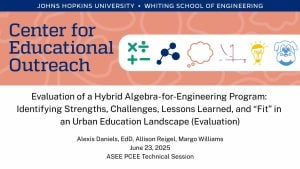
BOAST Evaluation (ASEE Presentation, Years 1-4) - Canva presentation (ASEE PCEE Technical Session)
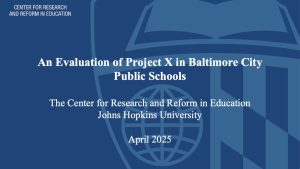
Project X Evaluation (Center for Research and Reform in Education, April 2025, Year 5) - JHU CRRE — WSE Project X Evaluation — Overview of Findings PPT Full report available upon request.
Role Model Videos
Ten role model videos were created and integrated into the program. Role model videos featured predominantly minoritized professionals describing their work in engineering careers, how their interests developed, challenges they encountered, and how they persisted. Each role model video also has a series of reflection questions that prompt students to relate and connect with the role models’ experiences.
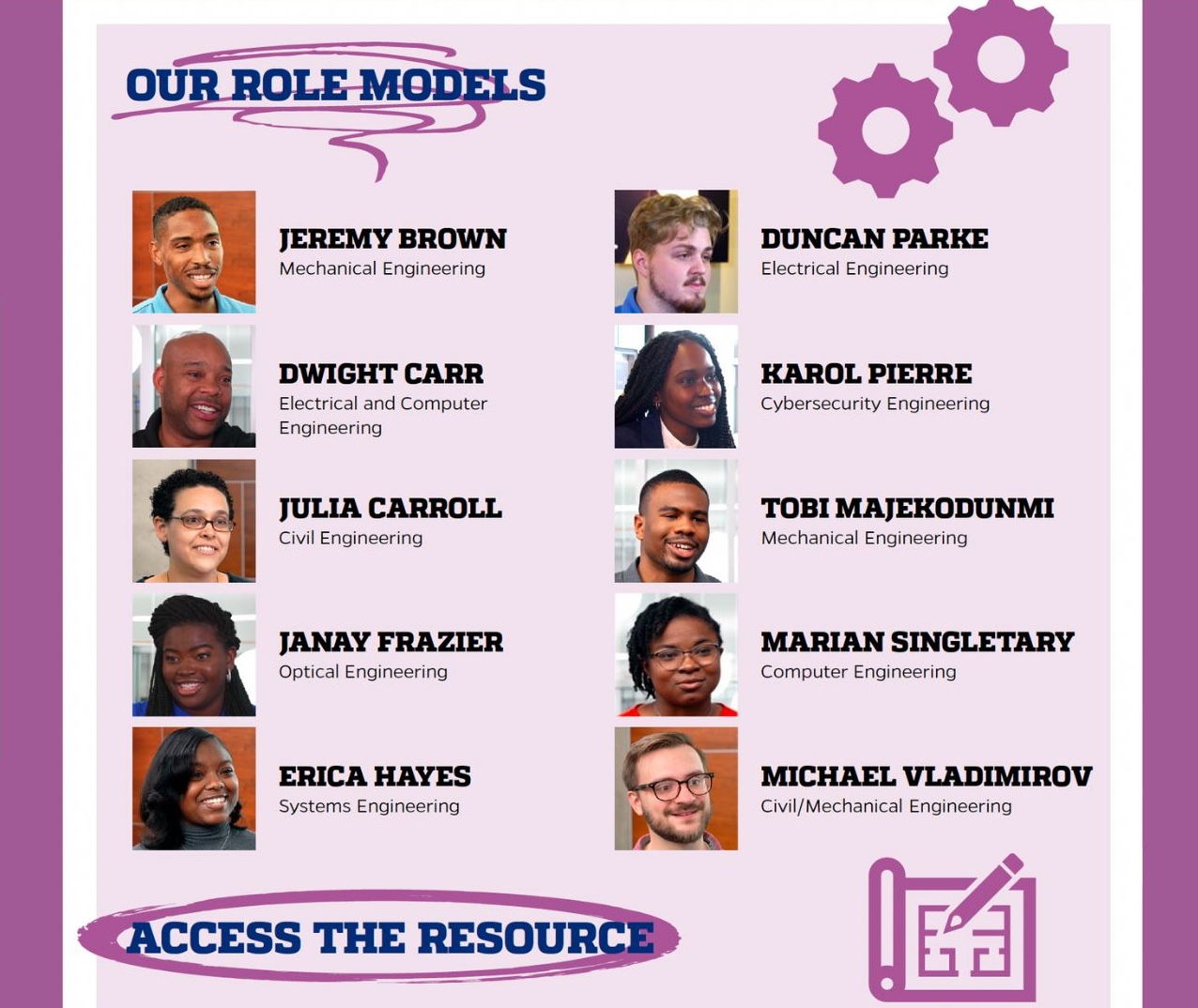
Access these videos here: BOAST Role Model Videos
Transcripts are available here: Transcripts.zip
One-Pager PDF: ASEE 2025 Resource Exchange
Frequently Asked Questions (FAQs) - Years 1-4
- Programming is part of a research study (see “Research Information” below to see what activities students at your school have access to)
- Free, after-school program teaching students to solve math and engineering challenges
- Guidance by a Johns Hopkins BOAST instructor after school and through online office hours
- Inspirational role model videos from local engineering professionals and students
- 3 free field trips throughout the school year
- Access to mental health professionals
- Program runs from mid October to late May
- 9th – 11th grade Baltimore City Public Schools students
- Achieved a C grade or better in Algebra 1
- Have an emerging interest in engineering and science careers
- A desire to strengthen math skills
The BOAST grant is coming to a close so no new applications are being taken at this time.
- 1 hour – Meet with JHU BOAST instructor once a week after school
- 2 hours – Online independent work throughout the rest of the week (asynchronous)
- The program will include 6 modules:
- Module 1: October-November
- Module 2: November-December
- Module 3: December-January (excluding Winter Break)
- Module 4: February
- Module 5: March-April
- Module 6: April-May
- Access to a dedicated space in your school to meet with the JHU BOAST instructor
- solve engineering challenges
- have access to computers
- work in groups or independently
- Independent work can take place anytime, anywhere with internet access
- Materials and tools will be provided to help solve engineering challenges
- Students are expected to use a Chromebook or laptop to access the curriculum
- Completion of the program earns students a college recommendation letter
- A chance to win $1,000 for the highest performing school
- Preferred status when applying to STEM programs such as Engineering Innovation and Building STEPS
- Strengthen math skills
- Expose students to engineering and science fields
- Potential to establish professional relationships
- Learn about new and emergent technologies
- Identify a staff member to provide support who will be paid by JHU
- Provide a dedicated space for students to work in such as a computer lab or with access to a laptop cart
- Maintain secure storage for student kits and in-progress projects
In addition to algebra-for-engineering programming for high school students, BOAST has a research component. With this research, we would like to find out whether participating in BOAST helps students improve math skills, gain more interest in engineering, or develop career goals in STEM (STEM is short for Science, Technology, Engineering and Math.) We hope that this study can help more students who are interested in STEM careers reach their goals. By participating in the research, students can help contribute to the success of others in the future. Depending on what school students go to, they can be part of one of two research groups. Students in Group One will participate in algebra-for-engineering lessons and other activities. Students in Group Two will participate in engineering career development activities and receive incentives to participate. If they agree to be a part of this study, they may take part in one or more of the following research activities:
- Participating in a one-on-one 30-45 minute interview
- Taking a survey at the beginning and the end of the school year
- If you are in Group Two and do not participate in the algebra-for engineering lessons, you will receive a $15 gift card each time you complete the survey.
Throughout the research, students’ information will be kept private. Student names will not be included in the data used in the research. Also, all the data will be kept very secure. Anything students do or say during the research study will be completely private, and it will never be shared with anyone else — not with parents, teachers, or other students. The research is being conducted by Rachel E. Durham at Notre Dame of Maryland University and Michael Falk at Johns Hopkins University. We are inviting the BOAST participants to participate in the research, but it is completely voluntary. No one can make students take part of this research study, even if they participate in BOAST lessons or other BOAST programming. If you have any questions about the research study or about what participating means, please contact Rachel Durham at 443-627-1147 or email her at [email protected]. She would be very happy to answer any questions about the research study, or about BOAST.
BOAST is Supported by the National Science Foundation under Grant No. DRL-2005790.
Research Information (Years 5-6)
The purpose of the Project X research project is to find out if participating in a hybrid algebra-for-engineering elective class helps students improve math skills, increase interest in engineering, and develop ambitions for careers in STEM (STEM is short for Science, Technology, Engineering and Math.) We hope that the information from this study will help school leaders find effective ways to help more students with interests in STEM reach their goals.
Students in the Project X elective course are invited to:
- Participate in a survey at the beginning and end of the semester.
- Participate in a focus group interview. This interview would last 30-45 minutes and be conducted by staff from CRRE during the planned Project X class time.
- Rubrics used to evaluate student’s work in the class. This information will be captured in a data file after the class ends, and that data will be used in the research project.
Throughout the research, students’ information will be kept private. Student names will not be included in the data used in the research. Also, all the data will be kept very secure. Anything students do or say during the research study will be completely private, and it will never be shared with anyone else — not with parents, teachers, or other students. This research is being conducted by researchers at American University and Johns Hopkins University. If you have any questions about the research study itself, please contact Emily J. Yanisko at [email protected]. If you have questions about your rights as a research participant or feel you have not been treated fairly, you may also contact the Institutional Review Board at American University at 202-885-3447 or [email protected].
Baltimore City Public Schools IRB# 2024-052
American University IRB# 2025-19
BOAST and related material is based upon work supported by the National Science Foundation under Award Number (2005790). Any opinions, findings, and conclusions or recommendations expressed in this material are those of the author(s) and do not necessarily reflect the views of the National Science Foundation.
Get in Touch
Dr. Alexis Daniels
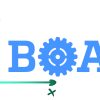
Baltimore, MD 21218
